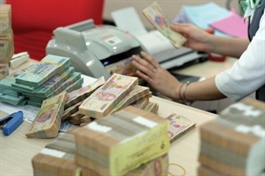Weak bank framework must be addressed
Weak bank framework must be addressed
As global economic uncertainties persist, enhancing the resilience of Vietnam’s banking system has emerged as a critical priority.
The International Monetary Fund (IMF) has urged Vietnam to reinforce banking supervision, strengthen capital and liquidity buffers, and, most importantly, modernise its framework for resolving weak banks, an issue long embedded in the country’s financial system.
The recommendations were delivered following the IMF’s Article IV Consultation Mission to Vietnam, which took place from June 11 to 24. Led by Paulo Medas, the IMF delegation engaged in a series of high-level meetings with Vietnamese policymakers, including Deputy Prime Minister Ho Duc Phoc, leaders of the State Bank of Vietnam (SBV), the Ministry of Finance, and the National Assembly (NA), as well as private sector stakeholders and policy institutions.
The delegation called on Vietnamese authorities to replace the current credit growth targeting model with an enhanced, risk-based monetary policy framework. The move, according to Medas, would bring greater transparency and sustainability to the system.
“To enhance banking system resilience, priority should be given to strengthening supervision, building capital and liquidity buffers, and improving the framework for dealing with weak banks,” he stressed.
Regarding the development of a framework to improve weak banks, on June 10, SBV Governor Nguyen Thi Hong presented a report addressing feedback from NA deputies and the official appraisal by the Economic and Finance Committee regarding the draft law amending and supplementing provisions of the Law on Credit Institutions. The report followed discussions held both in group sessions and on the National Assembly floor.
The draft law aims to institutionalise core Party guidelines that underpin Vietnam’s long-term development vision, particularly those on the role of the private sector and on accelerating digital transformation.
In addition, the draft integrates other provisions to create a more consistent legal framework for bad debt resolution and address persistent regulatory challenges.
Governor Hong highlighted that the government has mandated the lead agency to undertake a full review of operational shortcomings within the credit institution system, with the aim of amending and supplementing regulations to improve institutional efficiency and reduce the risk of non-performing loans.
In line with ongoing efforts by the government and relevant regulatory agencies, four weak banks have so far been placed under compulsory transfer to stronger commercial banks. Vietcombank acquired CBBank and rebranded it as the digital bank VCBNeo, HDBank took over DongABank, now renamed Vikki Bank. MB assumed control of Oceanbank and restructured it into MBV, while GPBank was transferred to VPBank.
However, at a banking restructuring seminar held in April, experts noted that while the recent transfers of weak banks to stronger commercial institutions represent continued progress in stabilising the financial system, the approach shows limited innovation in financial mechanisms and structural reform.
Nguyen Xuan Thanh, public policy lecturer at Fulbright University Vietnam, said the SBV should act as the lender of last resort to maintain liquidity and financial stability. “Restructuring needs to be backed by real financial resources, not just symbolic measures,” he noted.
He also called for dismantling cross-ownership to improve transparency and urged the creation of a unified supervisory body to oversee both banks and capital markets. “An integrated framework is essential to detect and manage risks early,” Thanh added.
Financial expert Dr. Nguyen Tri Hieu pointed to several regulatory shortcomings that continue to hamper the effectiveness of the current bank restructuring process. He proposed that acquiring banks should have a minimum charter capital of $120 million and be required to fully guarantee customer deposits at the restructured institutions to safeguard depositor confidence.
“A lack of transparency in financial disclosures, particularly when accumulated losses are not properly recognised, could distort the true financial position of banks, erode public trust, and weaken market discipline,” he said.
Hieu further cautioned that Vietnam’s current deposit insurance ceiling remains insufficient to provide meaningful protection for depositors, especially in the context of troubled banks.
“Bank restructuring is a long-term, complex process that requires close coordination among regulators, financial institutions, and society,” Hieu added. “Without transparency and meaningful reform, sustainable improvements in the banking system will remain out of reach.”
- 10:57 15/07/2025
























